
Our Addiction Resources
Navigating the world of addiction and recovery can be overwhelming. We’re here to provide clear, compassionate education and guidance. From practical advice for maintaining sobriety to informational guidance on the long-term effects of substance abuse, our content is a beacon of hope and understanding.
Our Team is Ready are ready to take your call
Call us Today!
or we can call you. Fill out form below
Our Blog
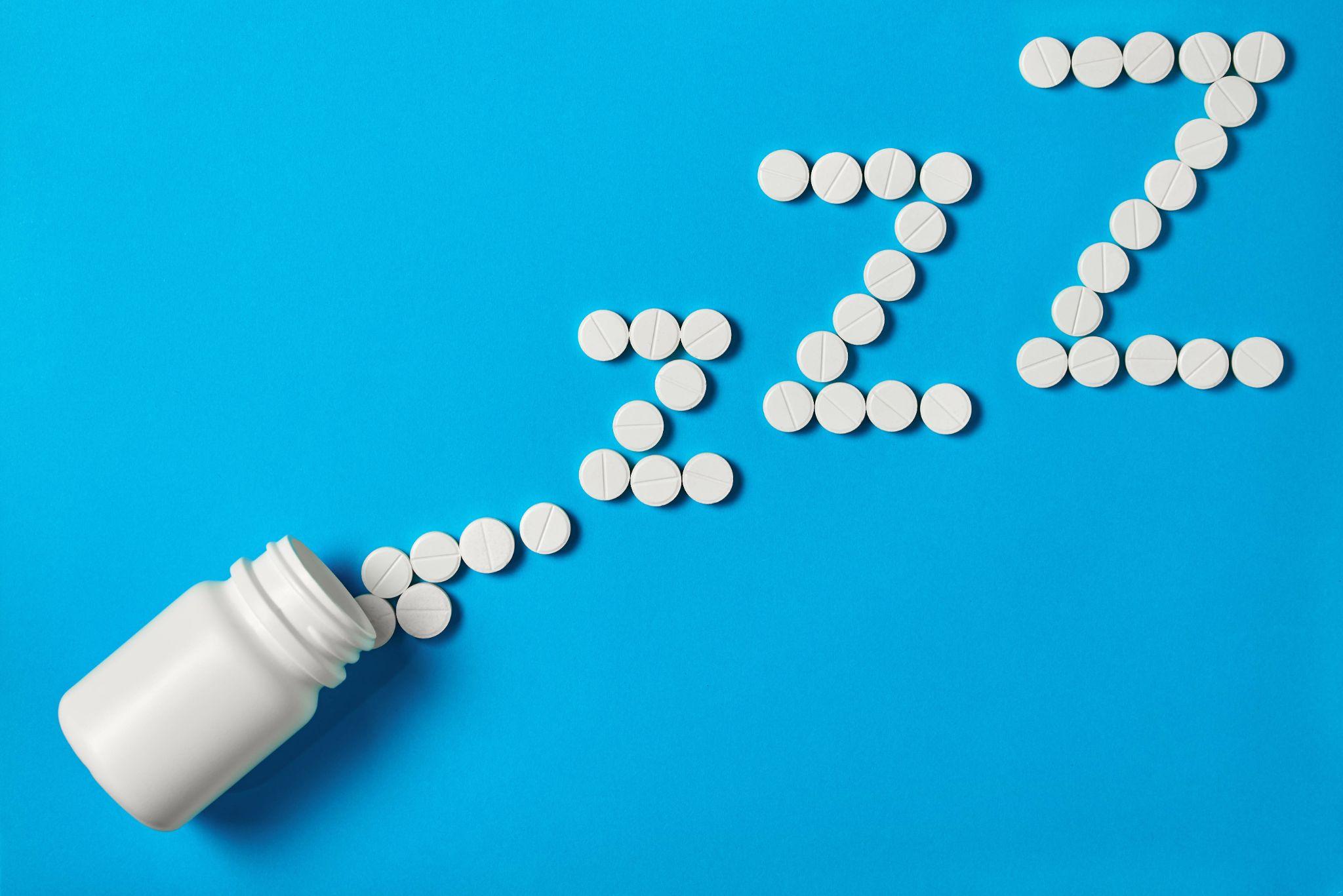
Can Trazodone Be Abused or Become Addictive?
Trazodone, a medication primarily prescribed for depression and insomnia, has gained attention not only for its therapeutic uses but also for potential abuse.
While it’s not as commonly abused as some other prescription drugs, understanding its abuse potential is crucial for patients and healthcare providers alike. At Lumina Recovery, we aim to shed light on the realities and risks associated with trazodone misuse.
What is trazodone?
Trazodone is primarily an antidepressant, belonging to the class of medications known as serotonin antagonist and reuptake inhibitors (SARIs). Trazodone is the generic name for the drug, while Desyrel and Oleptro are some of the brand names.
Unlike other antidepressants, trazodone works by having a unique pharmacological profile, targeting multiple neurotransmitter pathways. It’s known for its ability to balance serotonin levels, which plays a key role in mood regulation.
Additionally, trazodone affects other neurotransmitters like norepinephrine and histamine, contributing to its sedative properties. This dual action makes it effective not only in managing symptoms of depression but also in addressing insomnia, often seen in patients with depression.
However, its effectiveness in treating major depressive disorders and its sedative qualities can sometimes lead to misuse, especially in individuals seeking relief from insomnia or anxiety.
Is trazodone addictive?
Trazodone is generally not considered highly addictive, especially when compared to other substances like opioids or benzodiazepines. However, it can still be misused, and some individuals may develop a substance use disorder.
Dependence on trazodone can occur particularly in cases where it is used for a prolonged period, at higher doses than prescribed, or used in a way not intended by the prescribing physician. People who have a history of substance abuse or addiction may be at a higher risk of developing dependence on the drug.
Trazodone overdoses are also possible. Taking it in amounts exceeding the prescribed or recommended dosage can lead to an overdose, which can be dangerous and potentially life-threatening.
Physical dependence on trazodone can lead to withdrawal symptoms when the medication is reduced or stopped. Psychological dependence, where a person feels unable to function without the drug, can also develop. This is particularly true for those using trazodone for its sedating effects to manage insomnia or anxiety.
While dependence is a concern, it’s important to differentiate it from addiction, which is characterized by compulsive drug-seeking behavior despite harmful consequences. Trazodone is less likely to cause such addictive behaviors compared to more potent substances.
As always, trazodone should be used strictly according to a healthcare provider’s instructions, and any concerns about dependence or side effects should be discussed with a medical professional.
What are the signs of trazodone abuse?
Recognizing the effects of trazodone abuse involves observing changes in behavior and physical health. Key indicators include:
- Taking the medication in higher doses or more frequently than prescribed
- Doctor shopping or visiting multiple doctors to obtain extra prescriptions
- Using trazodone without a prescription, especially for sleep or recreational purposes
- Developing a tolerance, where higher doses are needed to achieve the same effect
- Experiencing withdrawal symptoms when not taking the medication, which can include anxiety, agitation, and sleep disturbances
- Changes in daily activities and responsibilities, often neglecting work, family members, or social obligations
- Physical side effects such as dizziness, blurred vision, or coordination problems, especially at higher doses
What are the withdrawal symptoms of trazodone?
Withdrawal symptoms from trazodone can occur when a person who has been using the medication regularly and for a prolonged period abruptly stops or significantly reduces their dose.
These symptoms can vary in intensity and duration depending on factors such as the dosage, duration of use, and the individual’s physiology. Common withdrawal symptoms include:
- Dizziness
- Headache
- Nausea
- Agitation
- Flu-like symptoms
- Fatigue
- Sweating
- Muscle aches
- Anxiety
- Depression
- Difficulty sleeping (insomnia)
Symptoms of insomnia can be particularly pronounced if trazodone was initially prescribed for sleep disorders. It’s important to note that abruptly stopping trazodone can lead to uncomfortable and potentially severe withdrawal symptoms.
Therefore, it is generally advised to gradually taper off the medication under the guidance of a healthcare professional to minimize withdrawal effects.
How is trazodone addiction treated?
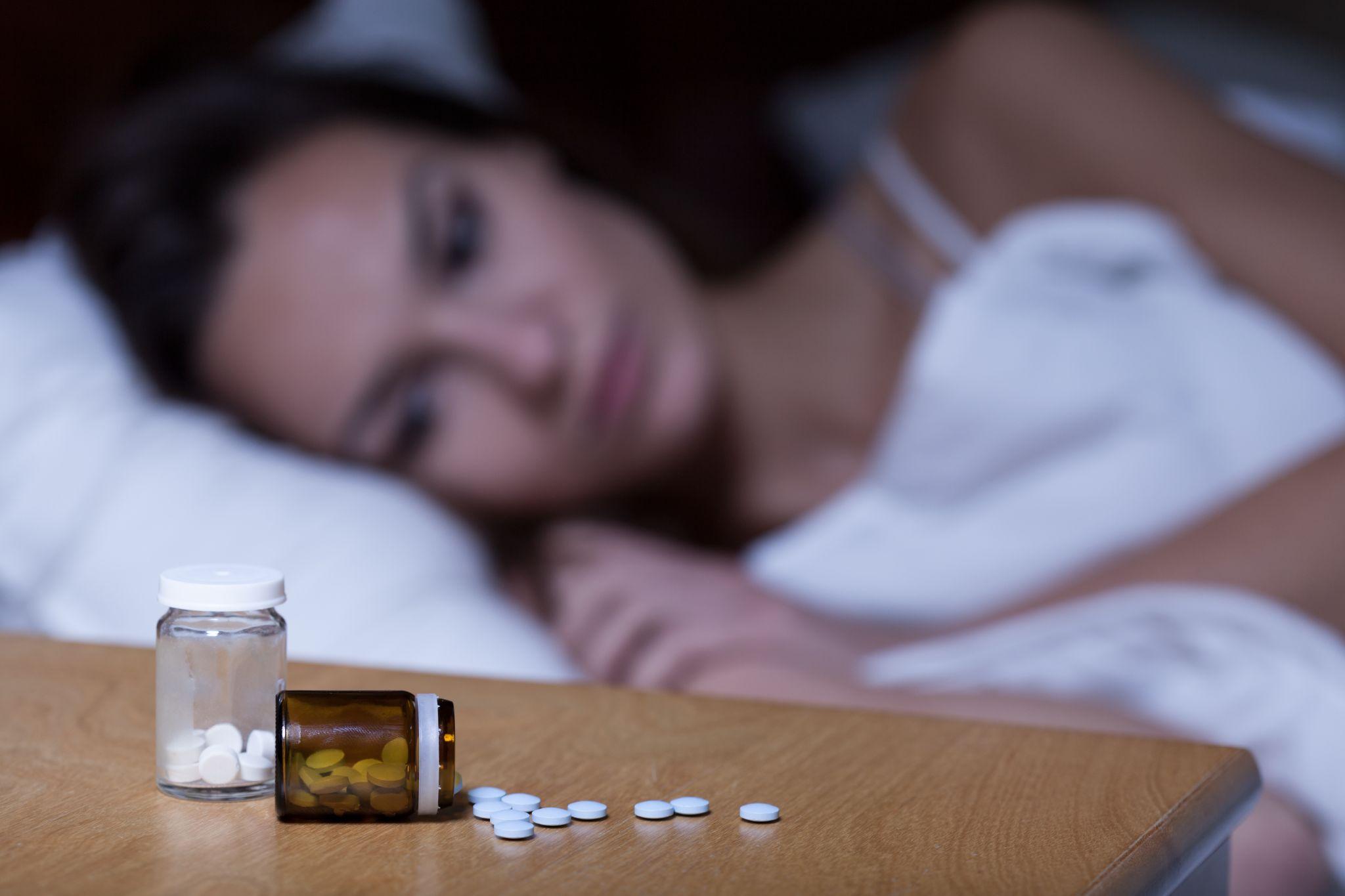
Treating trazodone addiction, like other forms of substance dependence, typically involves a comprehensive approach that addresses both the physical and psychological aspects of addiction. The main components of treatment usually include:
Detoxification. If physical dependence has developed, the first step is often a medically supervised detox process. This process allows for safe withdrawal from trazodone under healthcare professionals’ supervision. They can manage withdrawal symptoms and ensure the patient’s safety. Gradual tapering off the medication is often recommended instead of abrupt cessation to reduce the severity of withdrawal symptoms.
Therapy and Counseling. Psychological support is crucial in addiction treatment. This can include cognitive behavioral therapy (CBT), which helps patients identify and change thought patterns and behaviors related to drug abuse. Counseling can also address underlying issues such as depression, anxiety, or other mental health disorders that may have contributed to the misuse of trazodone.
Treatment of Underlying Conditions. If trazodone was initially prescribed to treat health issues like depression or insomnia, it’s important to find alternative ways to manage these conditions without reliance on trazodone. This might involve other types of medications or therapy methods.
Aftercare Planning. Long-term recovery requires a sustainable plan that may include ongoing therapy, support group meetings, lifestyle changes, and strategies to prevent relapse. This is a crucial part of treatment, as it helps to maintain the gains achieved during the initial treatment phase.
Lifestyle Changes and Holistic Therapies. Incorporating healthy lifestyle changes such as regular exercise, a balanced diet, and stress management techniques can be beneficial. Holistic therapies like yoga, meditation, and acupuncture may also be helpful for some individuals.
Understand Trazodone and Addiction With Lumina Recovery
While trazodone is not as prone to abuse as some prescription drugs, it’s important to remain vigilant. Understanding the risks, signs of abuse, and methods of prevention can help in managing its use effectively and safely.
Lumina Recovery offers prescription drug rehab programs and dual diagnosis services to help those dealing with addiction.
Reach out to our team today to learn more about our services and resources to help you or a loved one.
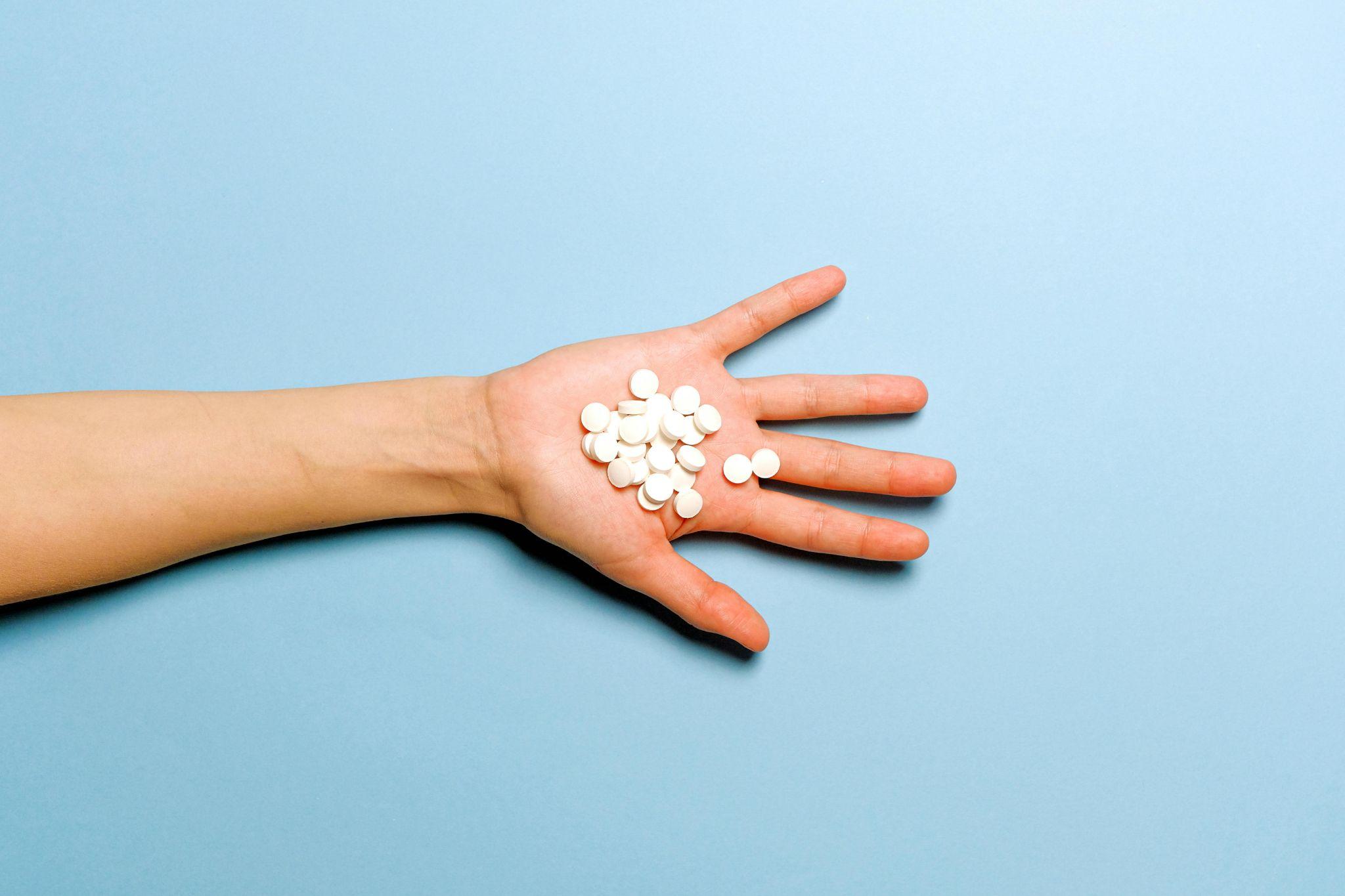
The Effects of Long-Term Opioid Use
Opioids, powerful pain-relieving medications, have become a critical concern in healthcare due to their addictive nature and the risks associated with long-term use.
Below, we want to shed light on the long-term effects of opioid use, helping individuals, caregivers, and healthcare professionals understand the risks and implications of prolonged opioid consumption.
Physical Dependence and Addiction
Physical dependence on opioids is a significant risk associated with their long-term use. This dependence results from the body’s adaptation to the presence of the drug, leading to tolerance, where higher doses are needed to achieve the same effect.
Alongside physical dependence, there is a risk of developing a psychological addiction. This addiction is characterized by an overwhelming desire to use opioids, regardless of the harmful consequences.
It’s crucial to differentiate between dependence, which is a physical condition, and addiction, which includes a behavioral aspect. Both can lead to a cycle of increased use and a struggle to discontinue the medication, despite the desire to do so.
Respiratory Depression
Chronic opioid use can critically impact respiratory function. Opioids suppress the brain’s ability to regulate breathing, leading to slow and shallow breaths, a condition known as respiratory depression.
This effect is particularly dangerous during sleep or when opioids are combined with other depressants like alcohol or benzodiazepines. In severe cases, this can escalate to respiratory arrest, which is life-threatening and requires immediate medical intervention. Monitoring and managing dosage is essential to mitigate this risk.
Gastrointestinal Issues
Opioids affect the gastrointestinal system by binding to receptors in the gut, leading to a slowdown in digestive processes. This can cause chronic constipation, a common and uncomfortable side effect.
In addition to constipation, individuals might experience nausea, vomiting, and a general disruption of normal gut function. These symptoms can lead to nutritional deficiencies, decreasing quality of life. Addressing these issues often requires a multifaceted approach, including dietary adjustments, hydration, and possibly the use of laxatives or other medications.
Hormonal Imbalance
The impact of long-term opioid use on the endocrine system can lead to a variety of hormonal imbalances. In both men and women, these imbalances can manifest as decreased libido, fertility issues, menstrual irregularities, and other hormonal disorders.
These changes can have profound effects on an individual’s physical health, emotional well-being, and quality of life. Recognizing and addressing these hormonal changes through medical intervention and lifestyle modifications is critical for those on long-term opioid therapy.
Immune System Suppression
Emerging research suggests that prolonged opioid use may suppress the immune system. This suppression makes opioid users more susceptible to infections and may impair their ability to recover from illnesses or injuries.
The mechanism behind this immune suppression is not entirely understood but is believed to be related to opioids’ impact on immune cell function. Awareness of this potential risk is important for individuals using prescribed opioids long-term, especially those with preexisting immune deficiencies or those in environments with high exposure to infectious agents.
Mental Health Effects
The long-term use of opioids can have profound impacts on mental health, increasing the risk of conditions like depression and anxiety. Opioids alter the brain’s chemistry and can affect neurotransmitters responsible for mood regulation. This disruption can lead to feelings of sadness, hopelessness, or anxiety, even in individuals with no prior history of these conditions.
The psychological effects can be compounded by the social and personal challenges often faced by those with chronic opioid use, such as strained relationships and reduced social engagement. Addressing these mental health concerns is an essential component of managing long-term opioid therapy.
Increased Pain Sensitivity
Opioid-induced hyperalgesia (OIH) is a paradoxical response where prolonged opioid use leads to an increased sensitivity to pain. This condition can be particularly challenging to manage, as it may be mistaken for worsening of the underlying pain condition, leading to increased opioid use and perpetuating the cycle.
OIH is thought to result from changes in the nervous system caused by long-term opioid exposure. Recognizing and diagnosing OIH is crucial, and it may require a multidisciplinary approach to pain management, including tapering off opioids and exploring alternative pain treatments.
Cohort studies with controlled trials have been done for chronic pain in patients with cancer and have concluded that opioids for cancer-related pain do not positively affect survival rates. Patients taking opioids compared to patients taking non-steroidal anti-inflammatory drugs (NSAIDs) show no significant improvement in pain, proving there is more risk than reward in using opioids for pain management.1
Sleep Disruption
Long-term opioid use can significantly disrupt normal sleep patterns. While opioids may initially induce drowsiness, they can interfere with the quality of sleep, particularly the rapid eye movement (REM) and deep sleep stages.
This disruption can lead to conditions like insomnia, fragmented sleep, and sleep apnea. Poor sleep quality can exacerbate pain, affect cognitive function, and impact overall health. Addressing sleep issues may involve adjusting the opioid regimen, incorporating sleep hygiene practices, or seeking specialized sleep disorder treatments.
Brain Function Impairment
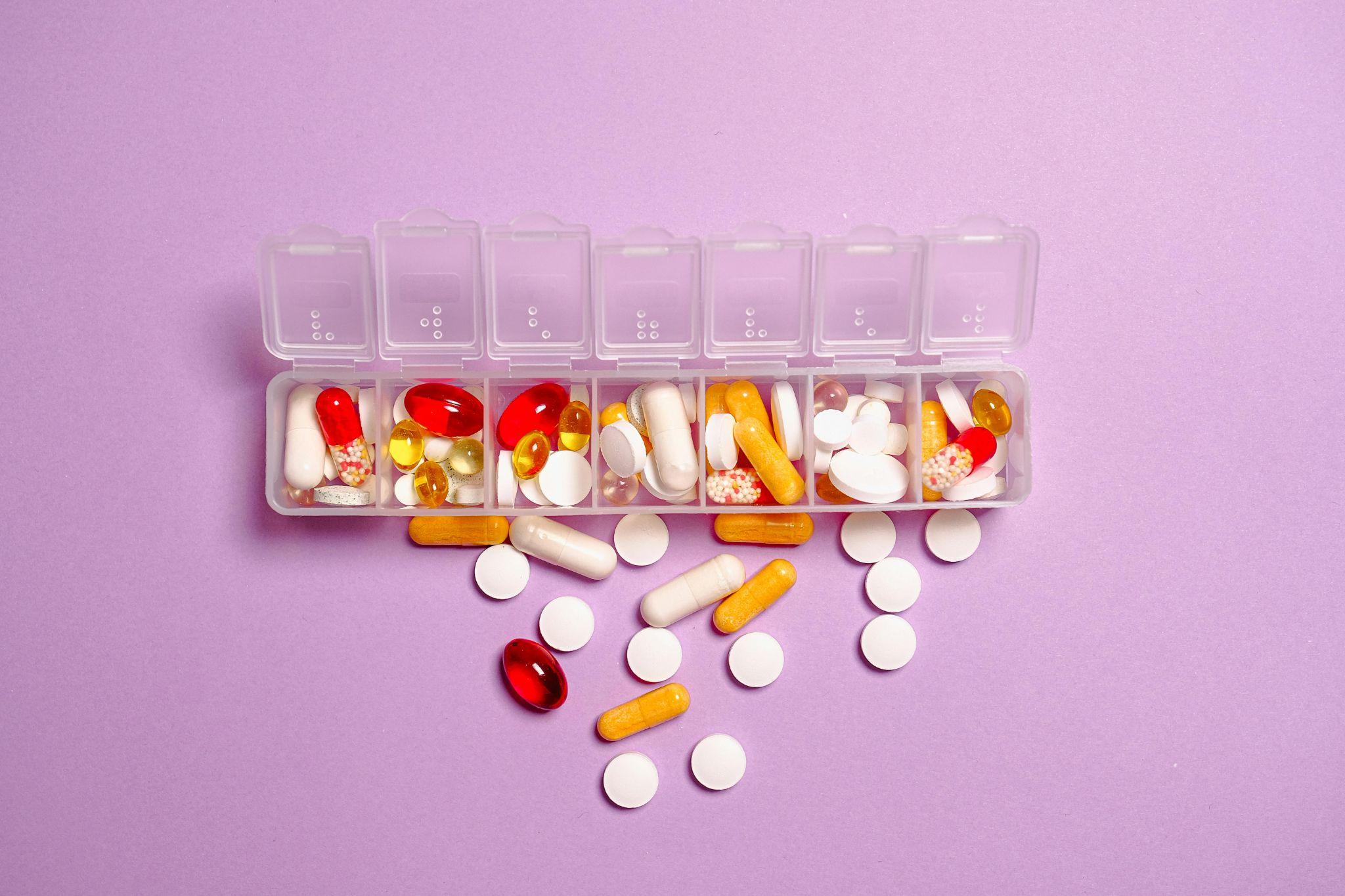
Chronic opioid use can lead to cognitive impairments, affecting memory, attention, decision-making, and executive functioning. These changes can result from both direct effects on the brain and indirect effects like poor sleep and mental health issues.
Cognitive impairments can significantly affect an individual’s ability to perform daily activities, maintain employment, and engage in social relationships. Cognitive assessments and interventions, including cognitive behavioral strategies and possibly adjustments in opioid therapy, can be valuable in managing these effects.
Risk of Accidental Overdose
The risk of accidental overdose increases with long-term opioid use, particularly as tolerance to the drug’s effects develops. As tolerance builds, individuals may inadvertently take higher doses to achieve pain relief, increasing the risk of overdose.
Accidental overdose can also occur when opioids are combined with other substances, like alcohol or sedative medications. Overdose is a medical emergency and can be life-threatening, requiring immediate intervention. Education on the safe use of opioids, awareness of overdose signs, and access to emergency treatments like naloxone are essential preventive measures.
Navigate Challenges of Opioid Use With Lumina Recovery
Understanding the long-term effects of opioid use is crucial for anyone prescribed these medications. While opioids can be effective for short-term pain management, their long-term use presents significant risks that must be carefully weighed against their benefits.
If you or someone you know is dealing with long-term opioid use, it’s important to consult with healthcare professionals for guidance on managing these risks and exploring alternative pain management strategies. Lumina Recovery offers opioid and fentanyl addiction programs and therapy services to help those struggling.
Contact our team of professionals today to learn more about opioids and addiction.
Sources:
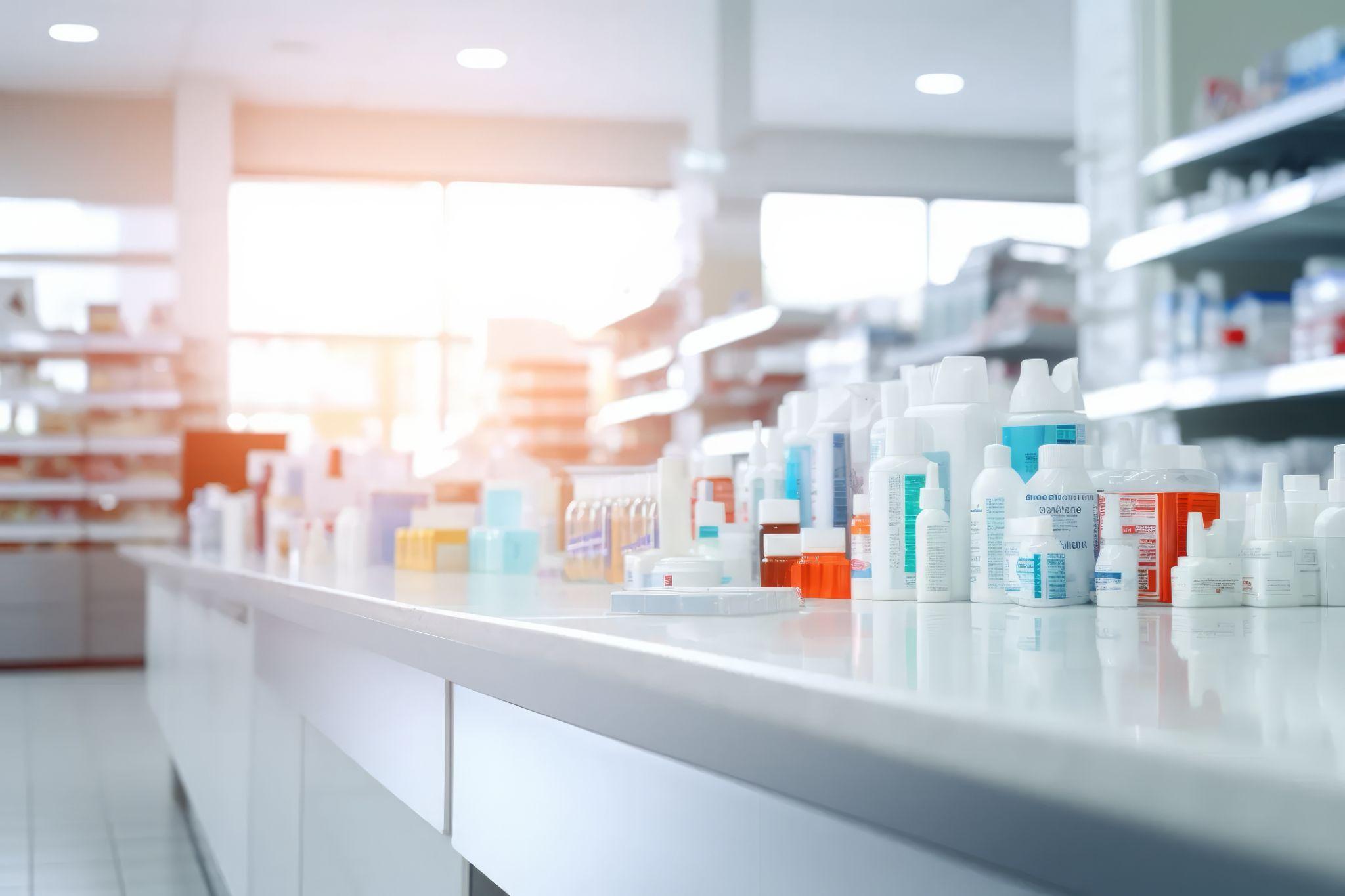
Most Commonly Abused Over-the-Counter Substances
In our pursuit of health and well-being, over-the-counter (OTC) medications have become a staple in many households, offering quick and convenient relief for a wide range of minor ailments. From the common cold to occasional sleeplessness, these medications seem like a straightforward solution.
However, this ease of access and perceived safety often masks a less-discussed issue: the potential for misuse and abuse of these substances. While OTC medications are generally safe when used as directed, their widespread availability has led to increasing instances of misuse.
This issue is particularly concerning because it often flies under the radar—over-the-counter drug abuse doesn’t always garner the same attention as illicit drugs or prescription substance abuse, yet the risks and consequences can be just as severe. The misuse of these substances varies from excessively large doses beyond recommendation to using them for purposes other than their intended medical application.
This can lead to a range of adverse health effects, from mild discomfort to severe, life-threatening conditions. The demographic affected by this issue is broad, encompassing all ages and backgrounds, making it a widespread public health concern. Understanding which OTC drugs are most commonly abused is crucial in preventing and addressing this growing concern.
1. Cough Medicines (Dextromethorphan)
Cough and cold medications, particularly those containing dextromethorphan (DXM), are a common target for OTC drug abuse, especially among teenagers seeking a cheap and accessible high. When taken in large quantities, these cough suppressants can produce psychoactive effects like euphoria, hallucinations, and dissociative states.
However, it’s important to understand the risks involved. High doses of DXM can lead to dangerous side effects such as rapid heart rate, high blood pressure, and in some cases, severe liver damage.
When cough medicines are combined with other substances like alcohol or prescription drugs, the risks increase exponentially, leading to potentially life-threatening situations. DXM abuse can also impair cognitive functions, leading to poor judgment and risky behaviors.
2. Pain Relievers (Acetaminophen and NSAIDs)
Pain relievers like acetaminophen and NSAIDs, such as ibuprofen and naproxen, are widely used for their effectiveness in managing pain and inflammation.
Acetaminophen, while safe in recommended doses, can cause severe liver damage when consumed in large amounts or over an extended period. The risk is higher for individuals who consume alcohol regularly.
NSAIDs, on the other hand, can lead to gastrointestinal problems like ulcers and bleeding, especially when used frequently or in higher-than-recommended doses. They can also increase the risk of heart attacks and strokes, particularly in those with existing heart conditions or prolonged use.
Overuse of these pain relievers is often driven by chronic pain issues, leading individuals to self-medicate without proper guidance, unaware of the potential health risks. It’s crucial to follow dosage instructions and consult healthcare professionals for chronic pain management.
3. Cold and Allergy Medicines (Pseudoephedrine)
Cold and allergy medicines, particularly those containing pseudoephedrine, are often misused for their stimulant properties. Pseudoephedrine can elevate mood and increase alertness, making it a target for abuse.
However, it’s important to understand the risks involved. Excessive intake of pseudoephedrine can lead to serious cardiovascular issues, including increased heart rate and blood pressure, which can be particularly dangerous for individuals with pre-existing heart conditions. Abuse can also result in severe agitation, anxiety, and insomnia.
Furthermore, pseudoephedrine is a key ingredient in the illegal manufacture of methamphetamine, which has led to stricter regulations on its sale. Despite these regulations, misuse continues, often involving the purchase of large quantities from multiple outlets.
4. Laxatives and Weight Loss Products
Laxatives and OTC weight loss products are commonly misused by individuals seeking quick solutions for weight loss. The abuse of laxatives can lead to severe dehydration and electrolyte imbalances, which can cause cardiac arrhythmias and kidney dysfunction. Chronic misuse can also lead to dependency, where the bowel becomes reliant on laxatives to function, leading to long-term digestive issues.
Similarly, OTC weight loss products often contain stimulants that can increase heart rate and blood pressure and may lead to severe heart issues in susceptible individuals. Misuse of these products is often driven by body image issues and the desire for short-term results, overlooking the significant health risks involved.
5. Motion Sickness Pills (Dimenhydrinate)
Motion sickness medications containing dimenhydrinate are frequently misused for their sedative and hallucinogenic effects. Abusers often seek the euphoric ‘high’ and hallucinations that high doses can induce.
Abuse of dimenhydrinate can lead to dangerous side effects like severe dizziness, irregular heart rate, seizures, and in extreme cases, coma. Long-term misuse can result in permanent memory impairment, heart problems, and even brain damage. It’s also important to note that combining these pills with alcohol or other drugs can exponentially increase these risks.
6. Sleep Aids (Diphenhydramine and Doxylamine)
OTC sleep aids containing ingredients like diphenhydramine and doxylamine are often misused for their strong sedative effects. While they are effective for occasional sleeplessness, regular misuse can lead to a dependency, where users become unable to sleep without them.
Over time, this can cause chronic drowsiness, memory impairment, and difficulty concentrating. Additionally, the sedative effects can impair motor skills, increasing the risk of accidents. Elderly individuals are particularly at risk, as they are more susceptible to the cognitive and motor impairments caused by these drugs.
7. Herbal Supplements
Herbal supplements, such as kratom and various ‘legal highs,’ are increasingly misused due to perceptions of being ‘natural’ and safe. Kratom, for example, is often used for its opioid-like effects and can lead to dependency and withdrawal symptoms similar to those of opioid drugs.
The lack of regulation and standardization in herbal supplements also means that the potency and purity of these products can vary greatly, increasing the risk of overdose and other adverse reactions. Furthermore, because these substances are not well-researched, the long-term effects on health are largely unknown, potentially leading to unforeseen health issues.

Get Help for OTC Drug Addiction at Lumina Recovery
Recognizing and understanding the most commonly abused OTC substances is a crucial step in promoting safe usage and preventing abuse. While these medications offer relief and convenience, it is important to use them responsibly and be aware of their potential for misuse.
Lumina Recovery provides drug addiction treatment programs for a variety of substances as well as detoxification programs.
Contact us today to learn more about the resources we offer for addiction.

The Journey of Athletes Addicted to Painkillers
Athletes are often admired for their strength, resilience, and commitment. In the pursuit of excellence and overcoming physical limits, some athletes find themselves grappling with an unexpected opponent: addiction to prescription opioid painkillers.
Lumina Recovery is here to delve into why professional athletes are particularly vulnerable to this addiction, the signs and symptoms of addiction, and the pathways to recovery.
Athletes Turning to Painkillers
Athletes are particularly susceptible to addiction to painkillers due to a combination of factors rooted in the high demands of their profession. Chronic pain and sport-related injuries are frequent companions of athletes, resulting from the intense physical demands inherent in sports.
To manage this pain and continue their rigorous training and competition schedules, athletes often turn to pain medication. These prescription drugs offer immediate relief, enabling athletes to perform despite underlying injuries. Research shows that 52 percent of NFL players in the United States used opioids in their career, with 71 percent reporting misuse of opioids.1
However, this relief comes with a risk. The constant pressure to perform at peak levels can lead athletes to rely heavily on these medications. This reliance is often compounded by a sports culture where painkiller use is normalized, or even encouraged, as a necessary means to achieve and maintain high performance. In this context, abusing prescription painkillers can be overlooked or underestimated.
This complex interplay of physical demand, cultural norms, and pressure to perform creates a challenging environment where athletes are at increased risk of developing an opioid addiction. Understanding these dynamics is crucial in addressing this growing concern in the athletic community.
Aspects of Painkiller Addiction
Several factors contribute to the risk of painkiller addiction among athletes:
Prescription Practices. Athletes often receive prescriptions for powerful opioids to manage pain from injuries. These drugs are effective but carry a high risk of drug abuse.
Unregulated Access and Self-Medication. Athletes might have more unregulated access to painkillers. Some may start self-medicating, increasing the risk of substance abuse.
Stress and Mental Health Issues. The high-stress environment in sports, along with undiagnosed or untreated mental health issues, can lead athletes to use painkillers not just for physical pain, but as a coping mechanism for emotional distress.
Peer Influence and Culture. Peer pressure and the culture within certain sports can promote the use of painkillers, making it difficult for athletes to resist or seek healthier alternatives.
Neglect of Long-Term Health Consequences. The focus on immediate performance gains can sometimes overshadow the long-term health risks associated with the prolonged use of painkillers.
Prescription Opioids That Commonly Lead to Addiction in Athletes
Some of the most frequently prescribed opioids that can lead to addiction in athletes include:
- Oxycodone (OxyContin, Percocet): Widely used for moderate to severe pain, oxycodone is effective but can be habit-forming, especially when used over a long period or in ways other than prescribed.
- Hydrocodone (Vicodin, Lortab): Often prescribed for pain after surgeries or injuries, hydrocodone is another powerful opioid that can lead to dependency if not carefully monitored.
- Fentanyl: Significantly more potent than other opioids, fentanyl is typically used for severe pain, such as in cancer treatment. Its high potency increases the risk of addiction and overdose.
- Morphine: Commonly used in hospital settings, morphine is effective for severe pain but can be addictive, especially with prolonged use.
Withdrawal Symptoms From Prescription Painkillers
Withdrawal symptoms can occur when an individual who is dependent on prescription painkillers reduces or stops their use. These symptoms may include:
Physical Symptoms. This includes muscle aches, headaches, sweating, fever, nausea, vomiting, diarrhea, and increased sensitivity to pain.
Psychological Symptoms. Anxiety, irritability, mood swings, depression, and insomnia are some of the many mental symptoms.
Cravings. A strong desire or compulsion to use opioids can occur with dependence.
Flu-like Symptoms. General malaise, runny nose, and chills often take place and resemble the flu.
The intensity and duration of withdrawal symptoms can vary based on the type of drug used, the duration of use, and the dosage. Medical supervision is often recommended during withdrawal to ensure safety and comfort.
Seeking Help and Treatment Options for Painkiller Addiction
Recognizing the need for help is an essential step in addressing painkiller addiction. Athletes, or anyone struggling with such an addiction, should seek support when they notice an inability to control their use of painkillers, such as using them in larger amounts or over a longer period than intended.
Additionally, if one finds themselves neglecting other important aspects of life, such as training, personal relationships, or health, due to drug use, it’s time to seek assistance.
Treatment for painkiller addiction is multifaceted and should be tailored to the individual’s needs. Detoxification under medical supervision is often the first step in managing the acute physical symptoms of withdrawal safely.
Following detox, rehabilitation programs, which can be either inpatient or outpatient, provide structured treatment that includes medical, psychological, and peer support.
Medication-assisted treatment (MAT), using medications like buprenorphine, methadone, and naltrexone, can help manage cravings and withdrawal symptoms and is often combined with counseling for best results.
Counseling and behavioral therapies, such as cognitive behavioral therapy, motivational interviewing, and group therapy, are vital in addressing the underlying causes of addiction and developing effective coping strategies.
Furthermore, support groups like Narcotics Anonymous offer peer support and a sense of community, which can be incredibly beneficial for those in recovery.
Addressing painkiller addiction requires a comprehensive approach, blending medical, psychological, and community support. Early intervention is key to a successful recovery, allowing individuals to return to a healthy, active lifestyle and, for athletes, to their passion for sports.
Get Resources for Athletes and Addiction at Lumina Recovery
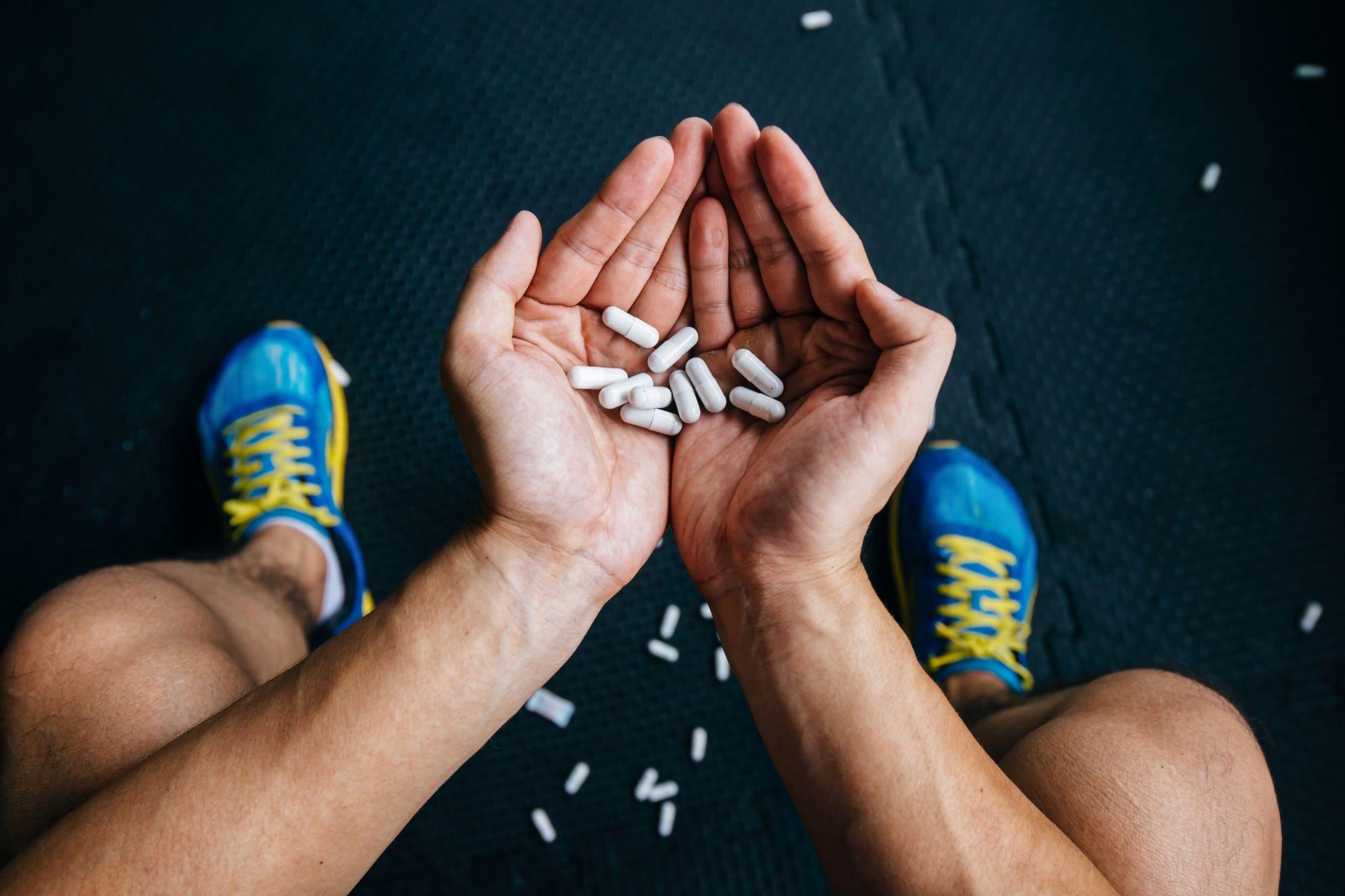
Addiction to prescription painkillers is a serious issue that can affect athletes at all levels. Understanding the risks, recognizing the signs of addiction, and knowing when to seek help are crucial steps in addressing this challenge.
Specialized programs for athletes and therapy services are available at Lumina Recovery for those who are struggling with pain and addiction.
Reach out today to our team of skilled professionals to take the first step toward a substance-free life.
Sources:

What Are Sober Living Homes?
Recovery from addiction is a journey, not a single step. This path often leads to a crucial phase known as sober living.
This stage is designed to bridge the gap between an inpatient facility and returning home to everyday life. It’s a safe space that fosters sobriety, offering support and structure for those who are navigating their new sober lifestyle.
Understanding Sober Living
Sober living homes (SLHs), also known as halfway houses, are shared sober living environments for individuals recovering from substance abuse. Unlike clinical treatment facilities, these sober living houses provide a less restrictive environment. Here, residents live together, supporting and holding each other accountable. These homes are often managed by peers or staff members who have walked the path of recovery themselves.
The environment in sober living homes is structured to reduce the risk of relapse from alcohol and drugs. Rules like curfews, mandatory group meetings, and no substance use are implemented to create a stable environment. These rules are stepping stones to rebuilding a disciplined, responsible lifestyle.
Sober living is part of a continuum of care, a comprehensive approach to addiction recovery. This concept acknowledges that recovery is a long-term process, requiring different levels of support at different times. After detox and inpatient rehab, sober living provides the next level of support. It’s a phase where individuals can strengthen their sobriety while attending an outpatient program and gradually re-integrating into society.
The Benefits of Sober Living
These homes are more than just a place for staying sober—they’re a crucial transitional phase. This period allows individuals to gradually adjust from the intensive care of inpatient rehab facilities to the independence of everyday life, applying and reinforcing the coping skills learned in addiction treatment programs in a real-world setting.
One of the most significant benefits is the community within these homes. Residents that stay in a sober living home are surrounded by peers who understand their struggles and can provide empathy and support. This network often extends beyond the stay in the home, offering long-term connections and a sense of belonging crucial for recovery.
Residents in sober living homes are encouraged to take charge of their lives. This means managing daily tasks, finding employment, or continuing education. This balance of independence, coupled with the support of the community, is essential for building confidence and self-reliance.
These homes provide a structured environment that is vital in early recovery. Regular schedules and house rules help residents establish healthy routines, reducing the chaos that often accompanies addiction and creating a sense of normalcy and stability.
Residing in a sober environment significantly reduces the risk of relapse. With substance-free living spaces and a community focused on sobriety, residents are less likely to encounter triggers that could lead to a relapse, providing a safer transition period.
Sober living homes often offer activities that promote personal growth, such as skill-building workshops, group therapy, and recreational activities, reinforcing what has been learned in inpatient and outpatient rehab programs. These opportunities help residents rediscover interests and passions that were lost during addiction, fostering a sense of purpose and direction.
In addition to peer support, many sober living homes provide access to counseling and emotional support. This can be crucial for addressing underlying issues related to addiction and developing healthier coping mechanisms for stress, anxiety, and other mental health challenges.
Many homes emphasize holistic health, including physical fitness, nutrition, and mental well-being. This comprehensive approach to health is essential for rebuilding the body and mind after the toll of addiction.
Day-to-Day Life in a Sober Living Home
Daily life in a sober living home is structured yet flexible. Residents typically have curfews and are expected to participate in household duties and regular meetings. This type of sober living structure helps to establish healthy routines and discipline, essential for sobriety.
Many sober living homes encourage or require residents to work or pursue education. This aspect helps integrate residents back into a normal routine and prepares them for life after the sober living program.
Regular meetings and counseling sessions are often part of life in a sober living home. These sessions provide continued emotional and psychological support while remaining in a sober living home, helping residents to deal with challenges and maintain sobriety.
Long-Term Recovery Support
Sober living homes are not the final step in recovery but a significant milestone towards a life of sobriety. They offer the necessary support and time to adjust to a sober lifestyle without the immediate pressures of independent living.
Through the skills and habits developed in sober living, residents are better equipped to face the future. The journey of recovery continues well beyond the length of their stay, but the foundation built here is critical.
Choosing the Right Sober Living Home
When selecting a halfway home, consider factors like location, rules, the structure of the program, and the type of support provided. It’s important to choose a home that aligns with your recovery needs and goals.
Before deciding, visit potential homes and research their reputation and success rates. Talking to current residents can also provide valuable insight into the home’s environment and community.
Transitioning Out of Sober Living

Transitioning out of a sober living home is a gradual process. It involves taking the skills and habits developed in the home and applying them to everyday life. This transition is a critical phase where independence and responsibility take a more prominent role.
Even after leaving the home, many residents continue to receive support. This might be through alumni groups, continued counseling, or regular check-ins. Ongoing support is crucial for navigating the challenges of early independence.
Sober Living Homes at Lumina Recovery
Sober living is a vital stage in the recovery process, offering a supportive environment to transition from treatment to everyday life. It provides structure, community, and the necessary skills for maintaining long-term sobriety.
Choosing the right sober living home and treatment center is a crucial decision. Lumina Recovery’s sober living homes and outpatient programs are a great place to start or continue your recovery journey.
Contact our team today to learn more about our sober living homes and if they are right for you.
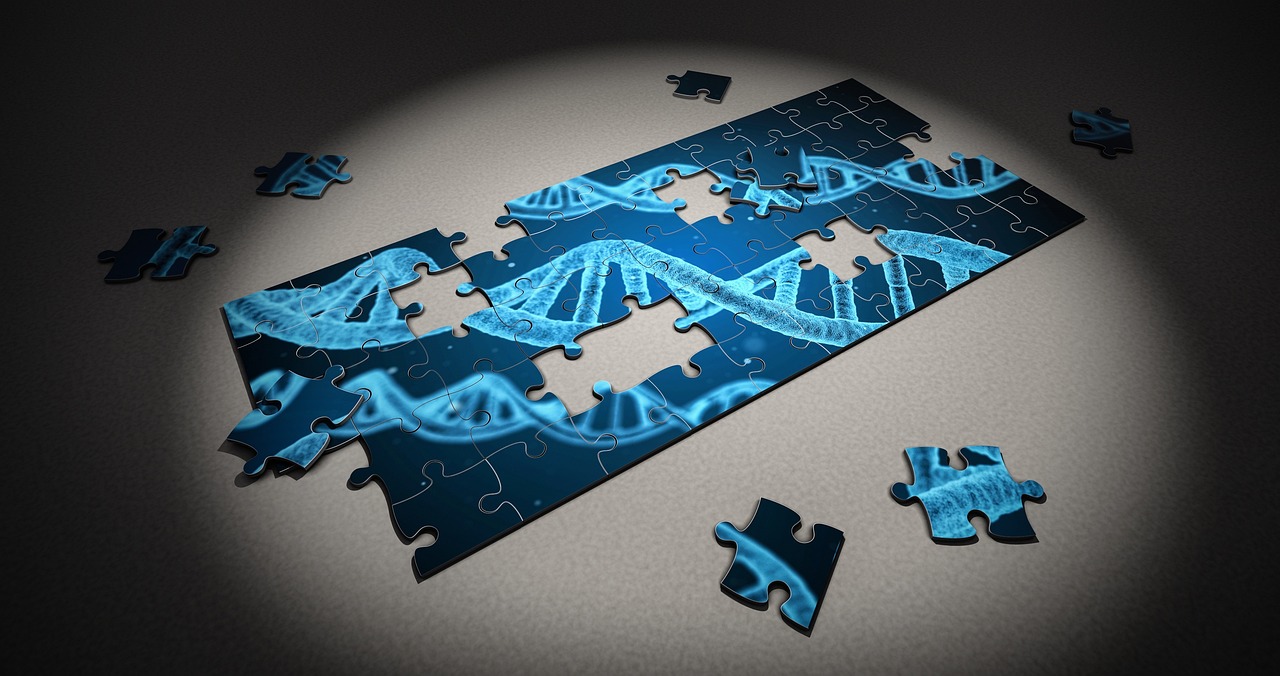
Understanding Genetics: Is Addiction Hereditary?
Addiction is a complex and often misunderstood condition, affecting millions of lives globally. One of the most frequently asked questions is whether addiction is hereditary. This not only concerns those struggling with addiction but also their families and loved ones.
At Lumina Recovery, we will explore the intricate relationship between genetics and addiction, aiming to provide clarity and understanding of the connection between substance use disorders (SUD) and gene expressions.
What is addiction?
Addiction is a chronic disorder characterized by compulsive engagement in rewarding stimuli, despite adverse consequences. It can involve substances like alcohol, drugs, or behaviors such as gambling. Addiction significantly affects the brain’s circuitry, leading to alterations in behavior, mood, and levels of consciousness.
Is there a genetic component to addiction?
Genetics may play a crucial role in addiction. For example, research shows that about 45-65% of susceptibility to alcohol addiction is due to genetic factors.1 This genetic influence is complex and involves multiple genes.
Having a genetic predisposition to addiction doesn’t mean someone will develop an addiction. Instead, it means they have a higher risk of developing an addiction compared to someone without such a genetic background.
Genes can influence an individual’s metabolism of substances, sensitivity to drugs or alcohol, and likelihood of developing addictive behaviors.
How do genetics influence addiction?
The influence of genetics on addiction manifests in several ways. Genetics can affect how the brain reacts to substances, changing the level of pleasure or reward someone feels.
For instance, certain variations in genes related to the brain’s reward system can make some individuals more susceptible to the euphoric effects of drugs or alcohol. Genetic factors influence personality traits such as impulsivity or sensation-seeking, which are associated with higher addiction risks.
Can a family history of addiction increase risk?
Having a family history of addiction increases an individual’s risk. However, it is crucial to consider this risk in a broader context. While genetics provide a predisposition, they do not predetermine addiction.
Environmental factors, such as exposure to substances, stress, social influences, and trauma, interact with genetic predispositions to influence the likelihood of developing an addiction. For those who have family members that struggle with addiction, it’s important to be aware of this high risk and to take proactive steps to reduce it.
This might include avoiding recreational drug use, developing healthy coping strategies, and being careful when using prescription medications with addictive potential. It’s also beneficial for individuals with a family history of addiction to engage in regular mental health check-ups and seek early intervention if they notice signs of addictive behavior.
Are certain types of addiction more hereditary than others?
Research indicates that certain addictions have a stronger genetic component. For example, alcoholism is one of the most studied in terms of its hereditary nature. Studies have found specific genetic patterns that significantly increase the risk of alcohol dependence.1
Drug addiction to certain substances, like opioids and nicotine, also exhibit strong genetic links. However, the heritability of addiction varies depending on the substance and individual genetic differences. All types of addiction are influenced by a combination of genetics, environmental factors, and personal experiences.
If addiction runs in your family, what precautions should you take?
Being aware of a family history of addiction is critical in taking preventive steps from developing a substance use disorder. Firstly, individuals should consider avoiding or being extremely cautious with substances that can lead to addiction. This includes alcohol, prescription medication, and illicit drugs.
Engaging in activities such as exercising, eating well, and getting sufficient sleep can promote well-being and health. It’s equally important to develop strong emotional coping skills and seek supportive relationships.
Awareness of the signs of addiction and seeking early intervention if these signs appear can be lifesaving. Counseling or therapy can also provide strategies to manage stress and emotional challenges without resorting to substance abuse.
Can genetic testing predict addiction?
While genetic testing can identify certain susceptibilities to addiction, it is not a definitive predictor. The relationship between genetics and addiction is complex and influenced by a myriad of factors beyond genetics alone.
Genetic testing might reveal a predisposition to addictive behaviors, but environmental factors, personal experiences, and individual choices play a substantial role in whether a person actually develops an addiction.
Genetic testing can indicate susceptibility to addiction, but it is not the sole determinant. Factors such as surroundings, life events, and decisions also influence whether someone becomes addicted.
How important is the environment in relation to genetics?
The environment is incredibly important in the development of addiction, often interacting with genetic predispositions. Factors such as drug and alcohol exposure, stress, family dynamics, financial conditions, and life experiences can modify the likelihood of genetic predispositions leading to addiction.
For example, an individual with a genetic susceptibility might not necessarily develop an addiction if they are not exposed to certain risk factors, like high-stress environments or substance use. On the other hand, someone with no genetic predisposition might develop an addiction due to significant environmental influences.
This interplay highlights the need for a comprehensive approach to prevention and treatment that considers both genetic and environmental factors.
Is it possible to overcome genetic predisposition to addiction?

It is entirely possible to overcome a genetic predisposition to addiction. Awareness of one’s genetic risk can empower individuals to take proactive steps in managing their health and lifestyle.
By creating supportive environments, developing healthy coping mechanisms, and seeking professional guidance when needed, individuals can significantly reduce the likelihood of developing addiction.
For those who have developed an addiction, comprehensive treatment programs that include medical, psychological, and social support can be highly effective for long-term recovery. Recognizing a genetic predisposition as a risk factor, rather than a predetermined outcome, is crucial in overcoming these challenges.
Learn More About Genetics and Addiction With Lumina Recovery
Understanding the hereditary aspects of addiction is a crucial component in addressing this complex condition. While genetics may play a significant role, they do not seal one’s fate.
With help, knowledge, and good choices, people can control the risk and live happy, addiction-free lives. Lumina Recovery offers detox and therapy programs to help those struggling with addiction and recovery.
Remember, you are not alone in this journey, and help is always available. Reach out to our team of professionals today to learn more.
Sources:

The Importance of Family Support in Addiction Recovery
Addiction is a disease that doesn’t just affect the person struggling with substance use—it ripples through families, impacting relationships, emotional well-being, and financial stability.
While professional treatment is crucial for recovery, family support plays an equally vital role in ensuring long-term success. Family support for addiction provides emotional encouragement, fosters accountability, and helps create a stable environment for lasting recovery.
How Addiction Affects Families
Addiction doesn’t just impact the individual using substances, but the entire family unit. Understanding these effects can help families navigate the challenges that come with supporting a loved one in recovery.
Emotional, Financial, and Psychological Impact
When a loved one struggles with addiction, family members often experience overwhelming emotions such as fear, frustration, guilt, and helplessness. The unpredictability of addiction can lead to chronic stress, anxiety, and even depression among family members.
Financial stress is also common, as money may be spent on legal fees, medical bills, or attempts to cover debts incurred due to substance use.
Common Family Dynamics in Addiction
Families often develop unhealthy patterns when dealing with addiction. Some of the most common include:
- Codependency – One or more family members may become overly responsible for the addicted person’s needs, neglecting their own well-being.
- Enabling – Family members may unintentionally support the addiction by providing money, shelter, or covering up consequences.
- Estrangement – Some families, overwhelmed by the chaos, may distance themselves entirely.
Impact on Future Generations
Addiction can have long-term consequences that extend across generations. Children raised in households with addiction face a higher risk of substance use disorders, as their environment greatly influences addiction.
Additionally, they may struggle with emotional regulation, forming healthy relationships, or managing stress effectively. Providing proper family addiction support is essential in breaking these cycles and fostering a healthier environment for future generations.
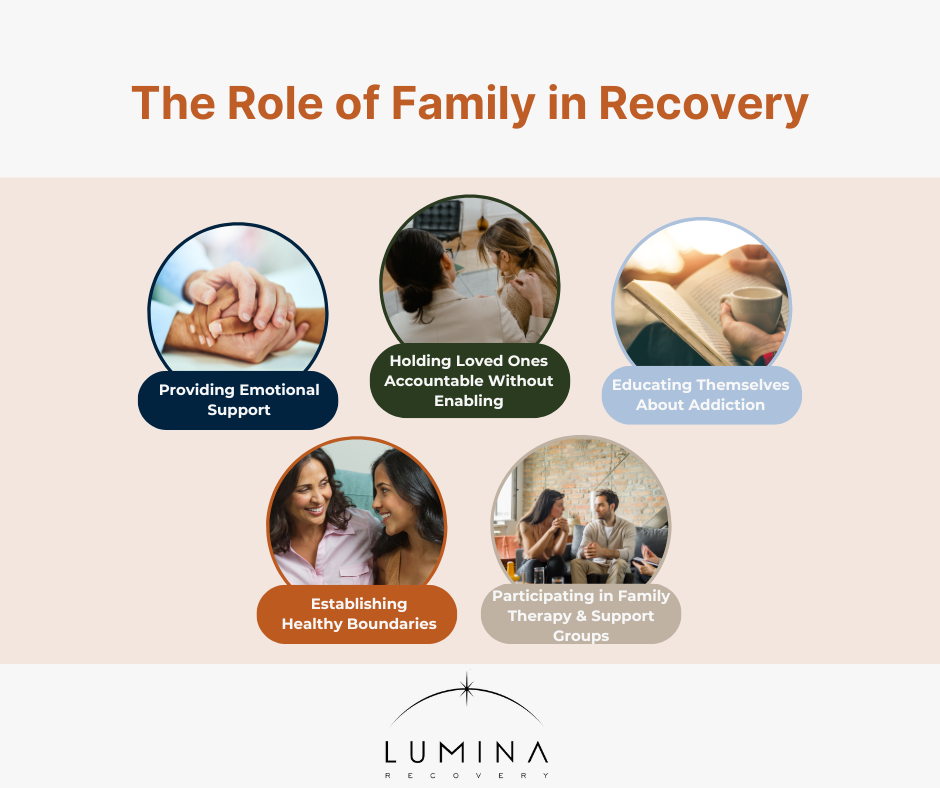
The Role of Family in Recovery
Families are an essential pillar in an individual’s recovery process. Their support, understanding, and involvement can make a significant difference in long-term sobriety.
1. Providing Emotional Support
One of the most important ways families can support a loved one in recovery is by offering emotional stability. Encouragement, patience, and positive reinforcement foster a sense of belonging and self-worth. Family and recovery are deeply interconnected, as a strong support system can determine long-term success or setbacks.
2. Holding Loved Ones Accountable Without Enabling
Support does not mean shielding a loved one from the consequences. Setting clear expectations and encouraging personal responsibility can promote sustainable recovery. Practical ways to enforce accountability include:
- Encourage attendance at therapy and support meetings.
- Refuse to cover up mistakes or provide financial bailouts.
- Set and stick to consequences for substance use.
3. Educating Themselves About Addiction
When families take the time to learn about addiction, they can better understand what their loved one is going through. Education helps to remove stigma and allows families to approach recovery with more compassion.
- Books About Recovery: Beyond Addiction by Jeffrey Foote, The Recovery Book by Al J. Mooney
- Podcasts About Recovery: Recovery Happy Hour, The Addicted Mind
4. Establishing Healthy Boundaries
Boundaries protect both the recovering individual and their family members. Without them, family members may inadvertently enable harmful behaviors or neglect their own well-being. Examples of healthy boundaries include:
- No drug or alcohol use in the home.
- Not engaging in arguments when a loved one is under the influence.
- Prioritizing personal mental health and self-care.
5. Participating in Family Therapy and Support Groups
Support groups and family therapy can help repair relationships and improve overall communication. These programs provide tools to help families navigate recovery challenges and maintain a strong support system.
Support groups such as Al-Anon, Nar-Anon, and SMART Recovery Family provide families with tools to cope effectively and understand how to support an addict in recovery.
Practical Ways Families Can Support a Loved One in Recovery
Support extends beyond emotional encouragement—families can take practical steps to help their loved one maintain a sober lifestyle.
- Encouraging healthy routines. Exercise, nutrition, and hobbies can aid in emotional stability.
- Assisting with job searches. Helping a loved one find a low-stress career can help boost their confidence and purpose.
- Supporting aftercare plans. Attending meetings together, providing transportation, and engaging in recovery follow-ups strengthen commitment.
- Creating a substance-free home environment. A supportive atmosphere significantly reduces triggers and cravings.
- Actively listening and communicating. Open communication helps build trust and ensures the recovering individual feels valued and understood.

4 Common Challenges Families Face and How to Overcome Them
Families supporting a loved one in recovery often face their own set of challenges. Here are some common struggles and ways to manage them.
1. Rebuilding Trust
Recovery is a process, and trust takes time. Open communication, consistent actions, and patience can help restore broken relationships. It’s essential for both the recovering person and their family to work together in fostering an environment of honesty and accountability.
2. Managing Expectations
Recovery is not linear. Families should understand that setbacks may happen and be prepared to support their loved ones without enabling destructive behaviors.
3. Handling Relapse
Relapse is a common part of recovery, but it doesn’t mean failure. Families should:
- Avoid blame and focus on solutions.
- Encourage re-engagement in treatment.
- Seek professional guidance if needed.
4. Balancing Support With Self-Care
Supporting a loved one should not come at the cost of personal well-being. Seeking therapy, joining support groups, and setting boundaries are essential self-care strategies. Family support in addiction recovery must be balanced with maintaining personal mental health.
FAQs
How important is family support in recovery?
Family support is critical in addiction recovery. It provides emotional stability, accountability, and encouragement, which can significantly reduce the risk of relapse and improve overall recovery outcomes.
Why is family important in the healing process?
Family plays a key role in healing by offering love, understanding, and a safe environment. When families engage in therapy and education, they can better support their loved one’s long-term sobriety.
Why is it important to involve the family in the treatment process?
Involving the family in treatment fosters better communication, reduces misunderstandings, and strengthens relationships. Family participation also improves treatment outcomes by ensuring that loved ones provide the right kind of support.
Strengthen Recovery Through Family Unity at Lumina Recovery
Family support plays an indispensable role in the journey of addiction recovery. It’s about striking a balance between caring involvement and healthy boundaries. As families navigate this challenging path, their support can become a powerful force in making the road to recovery less daunting and more hopeful.
Lumina Recovery offers family therapy sessions as well as specialized programs at our treatment centers to help you and your loved ones get the support they need.
Contact us today to learn more about the resources we have to support your recovery.
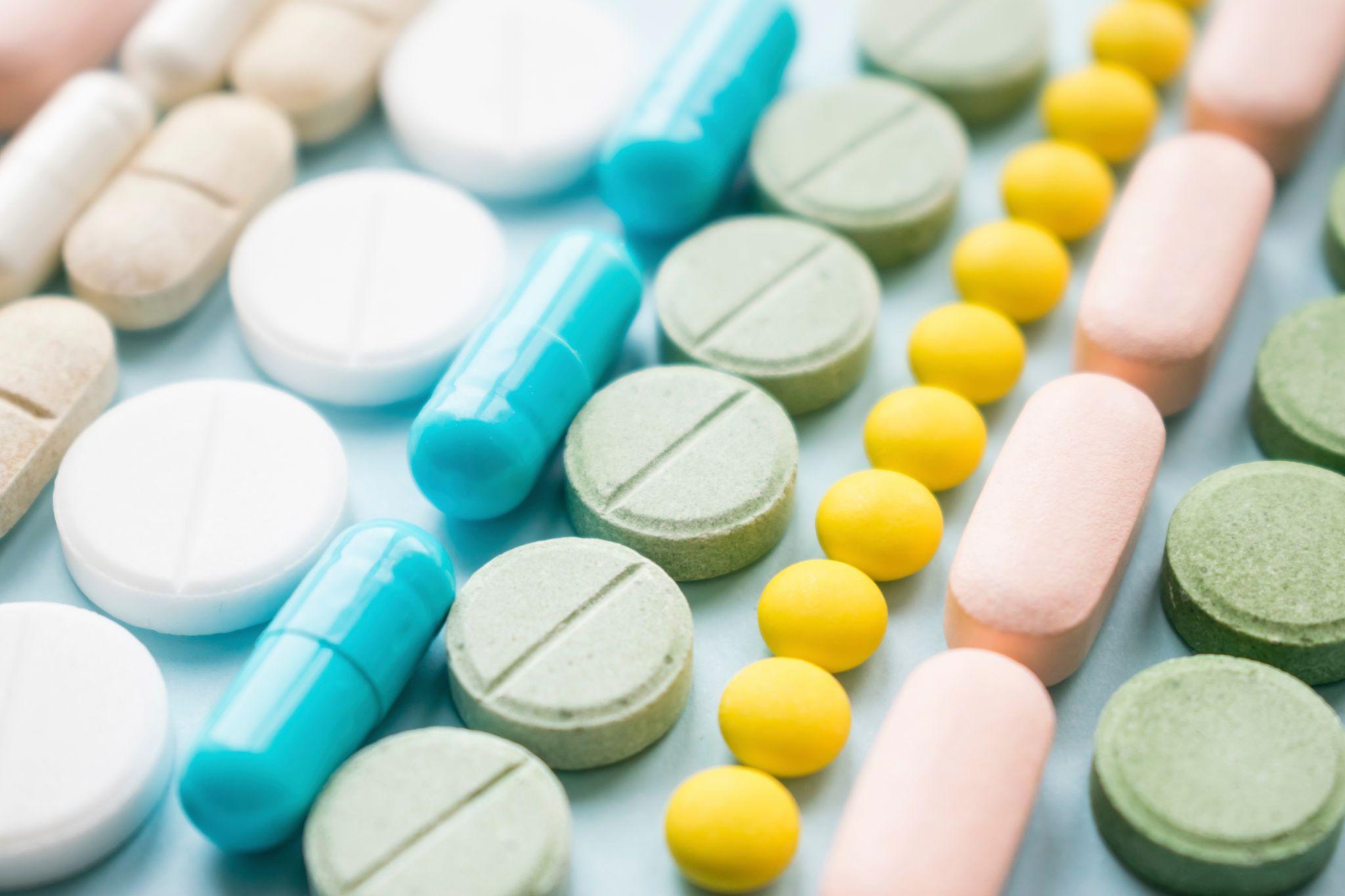
Glossary of Street Names for Drugs
The world of drugs is evolving every day, making it more important than ever to understand drug names, street names for drugs, and drug slang. These coded terms often mask the reality of substance use in our communities.
Our comprehensive list of slang words and common drug nicknames is designed to break down these barriers and empower you with essential knowledge to identify potential drug use.
At Lumina Recovery, we are committed to equipping individuals with the terminology and insights needed in our collective fight against addiction.
Why Street Names for Drugs Change Over Time
The evolution of drug names on the street is influenced by several factors:
- Pop culture and media. Movies, music, and social media not only entertain but also introduce new slang for drugs. These cultural shifts often inspire new drug street names that catch on quickly.
- Law enforcement pressures. As authorities become familiar with existing slang terms for drugs, users often develop fresh terms to stay one step ahead.
- Regional variations. Different areas may have their own unique drug lingo. The names of drugs on the street can vary widely, reflecting local customs and dialects.
- Social media influence. Social media has revolutionized how drug slang spreads online. Trends around social media and drug use continuously shape new street names for drugs and challenge efforts to monitor and address these evolving patterns.
These factors collectively contribute to why there are so many other words for drugs and why the list of slang words is constantly expanding.
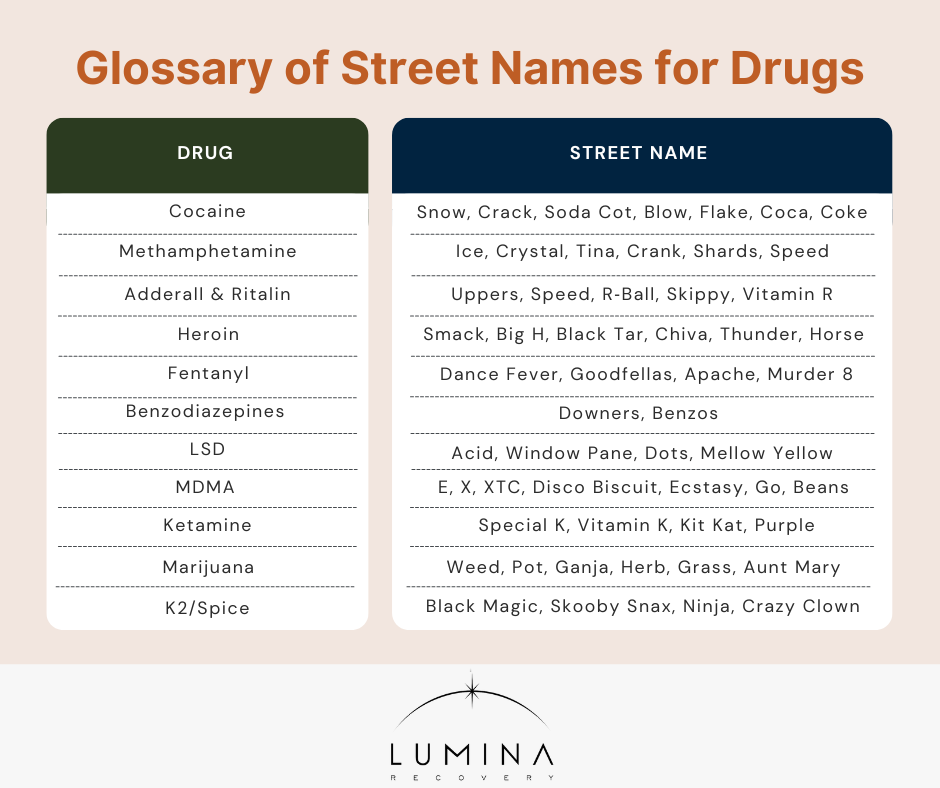
List of Street Names by Drug Category
Below is a detailed breakdown of slang for drugs categorized by substance type. This section not only provides cocaine street names and street names for heroin but also highlights common drug names that have become part of everyday language.
Stimulants
- Cocaine: Snow, Crack, Soda Cot, Blow, Flake, Coca, Coke
Cocaine can increase heart rate and blood pressure, and long-term use may lead to severe cardiovascular issues. The slang for cocaine is part of a broader set of drug street names used to disguise the substance.
- Methamphetamine: Ice, Crystal, Tina, Crank, Shards, Speed
Methamphetamine is highly addictive. Its potent effects can lead to significant mental and physical health issues, making it one of the most dangerous of the names of drugs circulating today.
- Adderall and Ritalin: Uppers, Speed, R‑Ball, Skippy, Vitamin R
When misused, these stimulant prescription medications, such as Adderall and Ritalin, can cause heart problems and anxiety. They are another example of different words for drugs that might be used casually but have serious implications.
Depressants and Opioids
- Heroin: Smack, Big H, Black Tar, Chiva, Thunder, Horse
Heroin depresses the central nervous system, leading to slowed breathing and a high risk of overdose. These heroin street names are part of the broader drug slang that can mask the substance’s dangers.
- Fentanyl: Dance Fever, Goodfellas, Apache, Murder 8, Tango & Cash
Fentanyl is extremely potent, and its misuse has contributed to a significant number of overdoses. These fentanyl street names are crucial for understanding the threat posed by this drug.
- Benzodiazepines: Downers, Benzos
Often prescribed for anxiety, drugs like Valium and Xanax, when misused can cause sedation and respiratory issues.
Hallucinogens and Club Drugs
- LSD: Acid, Window Pane, Dots, Mellow Yellow
LSD significantly alters perception and can lead to dangerous behavior during a trip. Recognizing these drug street names is key to understanding their potential risks.
- MDMA: E, X, XTC, Disco Biscuit, Ecstasy, Go, Beans
MDMA can induce intense euphoria and empathy but also poses risks like dehydration and overheating.
- Ketamine: Special K, Vitamin K, Kit Kat, Purple, Cat Tranquilizer
While useful medically as an anesthetic, recreational use can lead to dissociation and memory issues.
Cannabis and Synthetic Drugs
- Marijuana: Weed, Pot, Ganja, Herb, Grass, Aunt Mary
Marijuana affects cognitive function and coordination. The names of drugs associated with cannabis reflect its longstanding presence in pop culture.
- K2/Spice: Black Magic, Skooby Snax, Ninja, Crazy Clown
Unregulated and potentially dangerous, synthetic marijuana can lead to unpredictable and severe health problems.
This list of slang words and drug street names provides a useful reference for anyone looking to understand the slang terms for drugs that are commonly used today.
New and Emerging Street Names
Drug slang continues to evolve. Staying informed about emerging drug trends and names of drugs on the street is crucial:
- Pink Cocaine: Tusi, Tuci, Tucibi
Emerging as a popular party drug, this term is becoming part of the modern drug lingo.
- Xylazine: Tranq, Tranq Dope
The drug is known as “tranq,” but when mixed with opioids like heroin or fentanyl, xylazine is referred to as “tranq dope.” Its rising use underscores the lethal nature of some drug names.
Knowing these new drug street names ensures you remain knowledgeable about the latest slang for drugs and the evolving common drug nicknames.

FAQs
Why do drugs have street names?
Drug users and dealers create slang for drugs to avoid detection by law enforcement. These drug street names evolve with pop culture, regional influences, and social media trends, leading to a rich variety of other words for drugs.
What are the most common street names for cocaine?
There are several cocaine street names including Snow, Crack, Soda Cot, Blow, Flake, Coca, Coke, and other less common variants.
How can parents recognize drug slang in texts?
Parents should be alert to drug slang used in messaging. Look for names of drugs like “Molly” (for MDMA), “Downer” (for Xanax), or “Aunt Mary” (for marijuana). If unfamiliar drug names appear, a quick search of these slang terms for drugs can clarify their meaning.
What is Tranq Dope, and why is it dangerous?
Tranq Dope is a mixture of opioids like fentanyl with xylazine. This potent combination is especially dangerous because xylazine is not an opioid, making it harder to treat an overdose.
What are the common drug street names?
Common drug street names include:
- Cocaine: Blow, Snow, Coke
- Methamphetamine: Ice, Crystal, Tina
- Heroin: Smack, Big H, Black Tar
- MDMA: Ecstasy, Molly, E, XTC
- Marijuana: Weed, Pot, Ganja
- Fentanyl: Apache, Dance Fever, Murder 8
Understanding these common drug nicknames and names of drugs helps in recognizing and addressing hidden substance use.
Get Help for Drug Abuse With Lumina Recovery
By familiarizing yourself with this expansive list of slang words, including drug slang and common drug nicknames, you’re better equipped to understand and identify the names of drugs on the street. Awareness of these slang terms for drugs is a vital step in addressing substance use and protecting vulnerable individuals.
At Lumina Recovery, our detox and residential inpatient programs are designed to support those struggling with many different types of addictions. Our comprehensive approach ensures that you receive the help you need to navigate the complex world of addiction.
If you’re concerned about a loved one or your own substance use, get in touch with our team of addiction experts today.
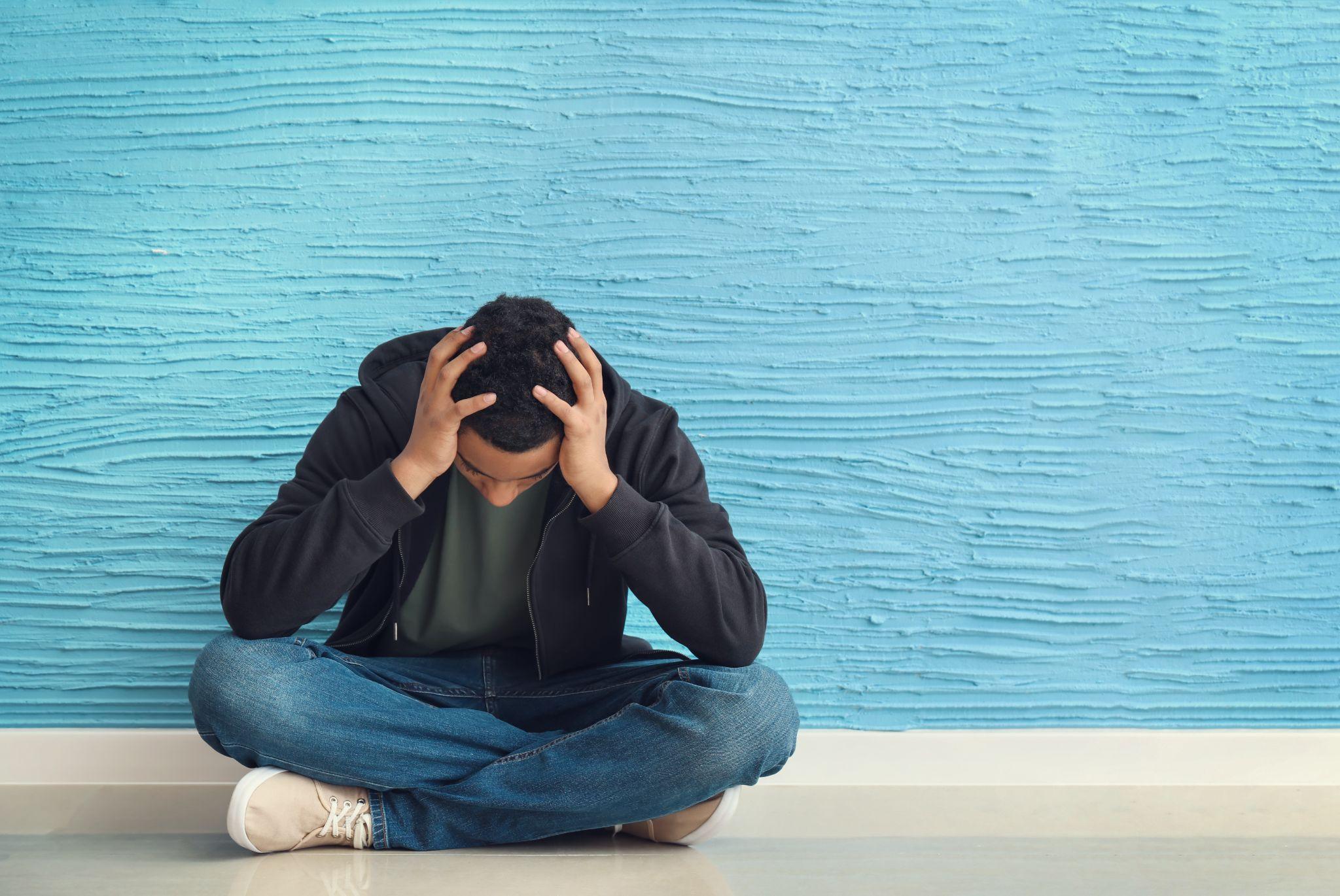
Early Warning Signs of Teen Substance Abuse
Substance use disorders in teens are a growing concern that can lead to serious physical, emotional, and social consequences. Here’s what the numbers show:1
- 1 in 8 teenagers engaged in illicit substance use over the past year.
- 61% of an increase in drug consumption occurred among 8th graders between 2016 and 2020.
- 62% of 12th graders have reported alcohol abuse.
- 50% of teenagers have experimented with drug misuse at least once.
As parents, educators, or caregivers, understanding the early warning signs of substance abuse in teens is crucial for timely intervention and support.
At Lumina Recovery, we aim to shed light on these early indicators, helping you recognize them in teenagers. Remember, early detection and a supportive approach can make a significant difference in a young person’s life.
8 Red Flags Your Teen Is Abusing Drugs or Alcohol
Recognizing the warning signs of substance abuse in teens is crucial for early intervention. Below are key indicators that may suggest your teen is struggling with drug or alcohol use:
1. Changes in Social Circles
One of the most noticeable early warning signs of drug use in teens is a shift in their social interactions. Peer pressure plays a significant role in this transition, as teens may feel compelled to use substances to fit in or gain acceptance from a particular group.
Adolescents experimenting with drugs or alcohol might gravitate towards peers who have similar habits or who exert influence over them to try these substances. This change can be a defensive mechanism to avoid judgment or to feel accepted in a new group that shares their risky behaviors.
Be observant if your teen suddenly changes their friend group, especially if they are reluctant to talk about these new friends or introduce them. A stark contrast in the demeanor, attitudes, or behaviors of these new peers compared to their previous friends can be a red flag.
Additionally, if your teen starts avoiding family gatherings or events they used to enjoy with their old friends, it might indicate they are moving in circles where substance abuse is more common.
2. Altered Appearance and Hygiene
Signs a teenager is using drugs often include noticeable changes in their personal appearance and hygiene. Substance abuse can significantly impact a teen’s interest in grooming habits, often leading to apathy towards their appearance. This might also be a sign of deeper psychological impacts, such as depression or low self-esteem.
A decline in grooming habits and personal cleanliness is a critical sign. In some cases, wearing inappropriate clothing, like long sleeves during hot weather, might be an attempt to hide needle marks or other physical signs of drug use.
3. Mood Swings and Behavioral Changes
Drugs and alcohol can significantly alter a teenager’s brain chemistry, leading to mood swings and behavioral changes. These substances can exacerbate or even mimic symptoms of mental health issues such as depression or anxiety. This makes it difficult to distinguish between substance-induced behaviors and other potential psychological conditions.
Be aware of sudden and drastic changes in mood in your son or daughter, such as unexplained aggression, irritability, hyperactivity, or withdrawal from family and usual activities. Also, watch for signs of drug abuse in teenagers, like prolonged sadness or loss of interest in activities they used to enjoy. Checking your teen’s social media for unusual activity can also be indicative of substance abuse.
4. Decline in Academic and School Performance
A decline in academic performance is a common and significant indicator of potential substance abuse in teenagers. As their focus shifts towards substance use, their interest and ability to keep up with school responsibilities often diminish.
Watch for a drop in grades or a sudden disinterest in schoolwork and projects. Regularly skipping school or classes, frequent tardiness, and a lack of participation in class are also warning signs.
Additionally, if the teen faces disciplinary actions at school, such as detentions or suspensions, which are out of character for their usual behavior, it might indicate underlying issues, including possible substance abuse.
5. Secretive Behavior and Lying
Teens abusing substances often become secretive about their activities as a way to hide their behavior from family and authority figures. This secrecy is compounded by a tendency to lie or give evasive answers about their whereabouts, activities, and the people they’re spending time with. Such behaviors are often driven by a mix of guilt, fear of being caught, and the desire to continue their substance use undisturbed.
Be alert to changes in how your teen communicates about their daily life. If they become unusually secretive, avoiding questions, or if their explanations about where they have been or who they are with seem implausible or inconsistent, these could be red flags. Defensive behavior when questioned about these discrepancies is also a common sign.

6. Physical Health Indicators
Signs of substance abuse in teens often include various physical health symptoms depending on the type of substance used. These symptoms can range from general changes in physical appearance to more specific symptoms related to particular types of substances. Always check with a healthcare provider about any physical indications of substance abuse.
Some general physical signs include unexplained weight loss or gain, changes in eating habits, and deterioration in physical appearance. Look for more specific symptoms like red or glazed eyes, a persistent cough (especially if they’re smoking substances), frequent nosebleeds (which can be a sign of snorting drugs), or unexplained bruises or marks on the body.
7. Changes in Sleeping Patterns
Substance abuse can significantly disrupt a teen’s natural sleep patterns. Depending on the substance, it can either lead to insomnia or excessive sleepiness. These changes are often a direct result of how certain substances interact with the brain and body, altering the natural sleep-wake cycle and impacting overall health and well-being.
8. Money Issues
Substance abuse can lead to financial issues due to the costs involved in maintaining the habit. Teens may start to require more money without a clear explanation, or they might resort to stealing money or valuable items from home. These behaviors are often driven by a desperate need to fund their substance use, which can become a dominant priority over time.
Commonly Abused Substances Among Teens
Understanding which substances teens commonly misuse can help parents and educators recognize the signs of drug use in students. From alcohol to prescription medications, teens may experiment with a variety of substances, often leading to harmful consequences:
- Alcohol: The most commonly abused substance among teens.
- Marijuana: Often perceived as harmless but can lead to dependency.
- Prescription Drugs: Such as opioids, stimulants, and sedatives.
- Nicotine & Vaping Products: Increasingly popular among teens.
- Cocaine & Methamphetamine: Less common but highly addictive.
Risk Factors for Teen Substance Abuse
Recognizing the risk factors that contribute to addiction can help caregivers take preventive steps. If a teen is exhibiting signs of using drugs, understanding these underlying influences can be crucial in providing early intervention:
- Family history of addiction
- Mental health disorders such as depression or anxiety
- Peer pressure and social environment
- Early exposure to substance use
- Lack of parental supervision
Find Solutions for Teen Substance Abuse With Lumina Recovery
Recognizing the early warning signs of teenage drug addiction is the first step in supporting recovery. If you notice these signs, approach the situation with empathy and concern rather than accusation, fostering an environment where your teen feels safe seeking help.
At Lumina Recovery, we offer specialized programs for college students 18 and older and dual diagnosis programs. While we do not treat minors, we understand the importance of early intervention and can help guide families toward the right resources.
Reach out today to seek help for your adult teen struggling with substance abuse.
Source:
Additional Resources
Once you have completed your rehabilitation program at one of our drug and alcohol treatment centers, you should try to surround yourself with people who can encourage you to stay sober. Many people find that support groups are the best source of encouragement. You can find hundreds of support groups and meetings in your community. Our drug addiction treatment centers stress the importance of personal chemical dependency resources, especially when you are new to sobriety. Below are various addiction and mental health resources for people in recovery who want additional support.
Christian Addiction Recovery Resources
Our substance abuse services aren’t limited to specific programs, but rather we believe in the importance of incorporating faith-based programs to promote spiritual healing, like our Faith in Recovery program.
With that said, below are some faith-based addiction recovery resources that could help you in your spiritual healing from addiction:
- Battlefield of the Mind by Joyce Meyer
- Boundaries by Dr. Henry Cloud & Dr. John Townsend
- Christian Families in Recovery: A Guide for Addiction, Recovery, and Intervention Using God’s Tools of Redemption by Robert and Stephanie Tucker
- Club New Life Christian Ministry for Addiction and Recovery
- Lost & Found: Recovery in Christ by Bruce Stanley
- Overcoming Emotional Obstacles through Faith: Navigating the Mind Field by Anthony Acampora, Director of Banyan’s Faith in Recovery Program
- The Case for Christ by Lee Strobel
Mental Health Resources for Recovery
Lumina Recovery consist of both mental health and substance abuse treatment facilities, meaning we offer mental health resources as well as chemical dependency resources. What’s more, addiction often co-occurs with mental illness, making these resources ever more important.
Below are some resources for mental health recovery that can help you or your loved one:
- This Emotional Life video series
- No Kidding, Me 2!! with Joe Pantoliano
- Dare: The New Way to End Anxiety and Stop Panic Attacks by Barry McDonagh
- Pleasure Unwoven: An Explanation of the Brain Disease of Addiction by Kevin McCauley
- Declutter Your Mind: How to Stop Worrying, Relieve Anxiety, and Eliminate Negative Thinking by S.J. Scott and Barrie Davenport
Call Us Today – (877) 716-7515

